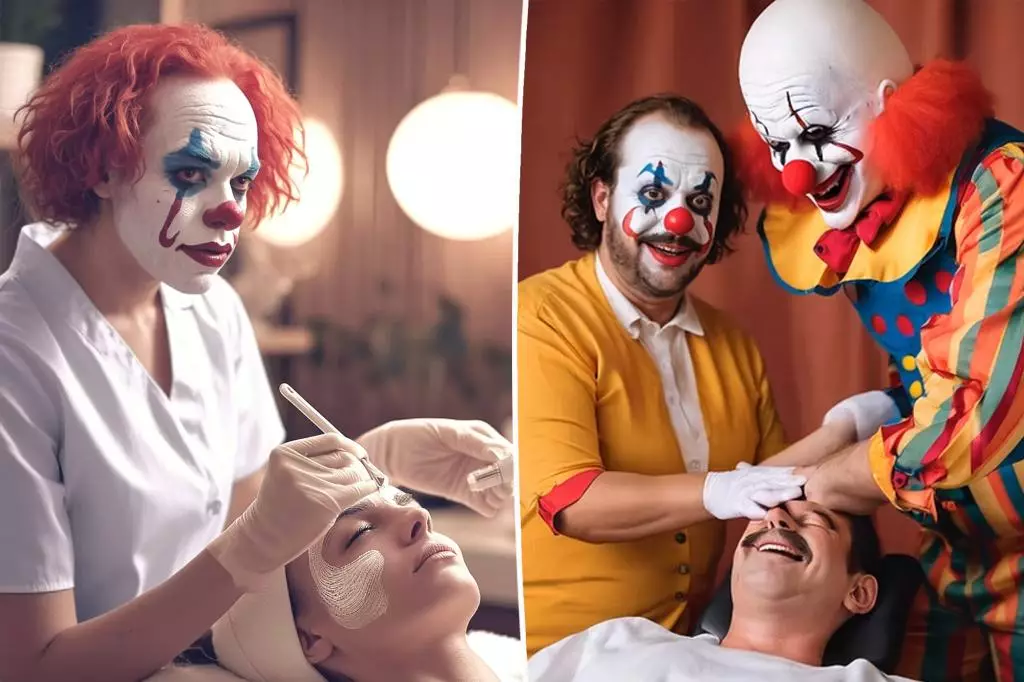The Hamptons have long been synonymous with opulence, sun-soaked beaches, and a relentless pursuit of wellness. However, this summer, an audacious prank has flipped the script, introducing a hilariously unexpected twist to the typical wellness culture narrative. Enter the “East Hampton Clown Massage,” a comical performance art masquerading as a wellness service. With its website displaying colorful images of clowns administering massages on the beach, it’s hard to tell whether this is a jest or a cruel commentary on the absurdity of contemporary wellness trends.
Under the Painted Smiles: A Strategic Poke at Wellness Fads
The hotbed of indulgent rituals and ostentatious experiences, the Hamptons has become a haven for those seeking to elevate their physical and spiritual health. Against this backdrop, the “East Hampton Clown Massage” cleverly channels the absurdity that often accompanies wellness culture. Its promise of “a variety of clown-based healing modalities in a warm, inviting environment” pokes fun at the lengths to which enthusiasts will go in the name of health.
The services offered, with whimsically named treatments like “Scream, Tummy Tickle, Laugh” and the cheeky “Joeky Reiki Bakey,” are outrageous enough to make one question the validity of modern wellness practices altogether. It invites participants to consider whether they’ve veered into a culture obsessed with novelty, losing sight of genuine healing in favor of the ludicrous.
Understanding the Humor: A Savvy Reflection of Hamptons Social Dynamics
While the concept is hilariously absurd, the manner in which it reflects socio-cultural dynamics in the Hamptons is worth a deeper inquiry. The creator, presumably a local with a comedic flair, draws from shared experiences and insider knowledge. References to well-known personalities—like the winking nod to Lizzie Grubman—add layers of humor that orient the joke firmly within the local context. This isn’t just random absurdity; it resonates because it speaks to in-jokes and cultural touchstones familiar to seasonal and year-round residents alike.
Such insider commentary implies a richer commentary on the exclusivity that often permeates elite wellness culture. By contrasting traditional services with clown-themed variants, the prankster playfully critiques the sometimes pretentious and commercialization of self-care, emphasizing how absurd the wellness industry can appear when observed through the right lens.
Engagement through Escapism: Clowns in the Marketplace
The prank’s execution extends beyond just the service descriptions. With offerings that include fictitious merchandise such as “sold out” clown make-up remover and logo-bearing apparel, the creators skillfully harness modern marketing techniques. They morph an inside joke into an interactive consumer engagement experience, which taps into an important relationship between art, entertainment, and commerce.
The allure of whimsical products not only invites laughter but creates a sense of community among those who discover this spoof. It cuts through the veneer of the conventional wellness industry with a refreshing sense of irreverence, giving individuals a shared laugh amid the exhausting pressures of striving for the ‘perfect’ wellness routine.
A New Kind of Healing: The Promise of Laughter
Beyond the satire, the concept of clown therapy as outlined in this outlandish parody raises intriguing points about the importance of humor in healing. As society grapples with increasing levels of anxiety and stress, there’s an undeniable appeal to freeing oneself from seriousness, even in wellness. The absurdly funny take on services like clown massages brings forth the notion that healing doesn’t always have to be somber or earnest.
The site’s fictional testimonials imply a community of A-list therapists working together in a bizarre yet captivating narrative that reminds us that laughter, and the loosening of our own seriousness, can be potent sources of healing. The creators have ingeniously packaged this insight within a farcical premise, but the underlying message rings true: sometimes, we all need a little clowning around to lighten the burdens we carry.
In sum, this inventive prank serves not only as an entertaining spectacle but also as an invitation to resist the allure of elevated wellness practices and embrace the ridiculousness that life—and self-care—can bring.

